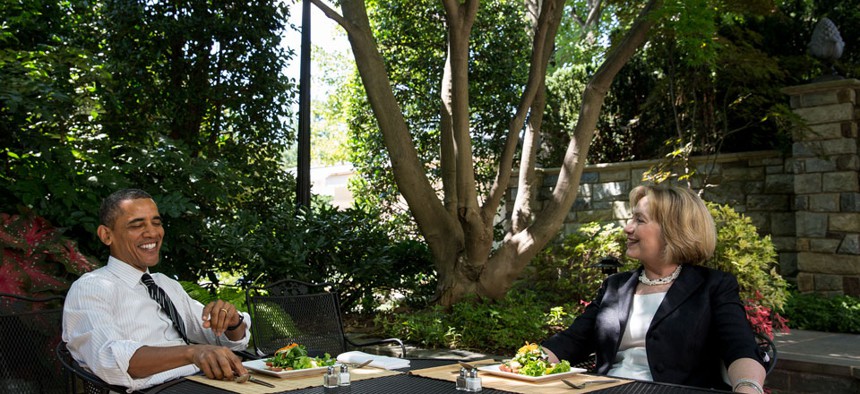
White House file photo
How Does Clinton Overcome Obama?
Her biggest problem won’t be age, her campaign strategy, or GOP attacks. It will be that many voters lack faith in government.
If Hillary Clinton forges ahead and runs for president, she'll be facing an electorate more disillusioned and more cynical than the one she faced before—and one perhaps less likely to respond to her message.
For that, she can thank the current president, Barack Obama. And it won't simply be because his approval rating is underwater. It's more than that. Seven years ago, both Clinton and Obama ran as curatives to the missteps of George W. Bush's administration. For Democrats, it was a singular political moment, a rare opportunity to energize the electorate and reaffirm the party's core values. And ultimately, voters favored Obama's change-agent appeal over Clinton's more establishment-driven pitch that emphasized experience and credentials.
It's fair to say that moment is long gone. And the hope that Obama could restore some order to a dysfunctional government seems to have vaporized with it, if current polls are to be believed. It may be Clinton now who has to pick up the pieces and somehow make the Democratic case for an activist, effective federal bureaucracy, an argument that has become harder to make.
Obama "has made a lot of mistakes. People thought he was an agent of change, but what he didn't have was executive experience," says Al From, the founder of the centrist Democratic Leadership Council and a top adviser to President Bill Clinton. "Running the government is more than the politics of good intentions."
The combination of frustration over the Iraq War and the government's halting response to Hurricane Katrina helped do in Bush—and by extension, John McCain in 2008. The legacy that Obama would bequeath to Clinton is more nuanced, pockmarked by a cascade of smaller-scale institutional failures—particularly in the president's second term—all of which, added together, suggest not a shining city on a hill, but more of a rickety shack by the railroad tracks. Indeed, there is a long list of mistakes that Republicans have eagerly sought to compare to Bush's handling of the 2005 hurricane. Call it Obama's Collective Katrina.
There was the Internal Revenue Service's seemingly off-mission probe of nonprofit political groups, the patients scandal at Veterans Affairs, the failure to protect diplomatic personnel in Benghazi, Libya, the repeated shortcomings of the Secret Service, and, perhaps most critically, the botched rollout of the federal health care exchange. More recently, there was the Centers for Disease Control and Prevention's flat-footed response to the Ebola threat in Texas—and while most Americans still have faith the government can prevent an outbreak of the virus, there is precious little room for error. "You get elected on hope. You get judged on performance," From says.
Beyond the drip-drip of micro-scandal, there remain hangovers from the first term. Few presidents have ever wielded power more aggressively than Obama did out of the box, pushing through the economic stimulus, continuing the bailout of Wall Street and the auto industries, and ramming through health care reform on party-line votes. And while the administration can legitimately argue that it helped keep the country from a deeper recession, the White House will be the first to concede that many Americans still aren't "feeling" the recovery.
In that sense, they may not see how government intervention has made a difference in their own lives. Those who have benefited the most from the Obama administration reside in small cohorts: wealthy Wall Streeters, auto-industry workers in a handful of states, and lower-income people who can now have health insurance through subsidies or Medicaid. (In fact, reforms that may have aided a wider swath of the public, such as foreclosure relief, were never pursued by the White House.)
The resulting composite is a picture of a government that rarely seems to be able to get out of its own way, while doing little to improve the lots of Americans who worry about stagnant wages, college costs, or child care. That's what a Hillary Clinton candidacy will have to push back against. And what drives progressives to distraction these days is the belief that a majority of Americans are with them when it comes to economic issues, but has soured on the capacity of the government to deliver on them. "What we have seen is a dramatic decline in people's sense of the ability to get it done," says Democratic pollster Celinda Lake. "The efficacy."
The latest ABC News/Washington Post poll, released this week, showed in stark detail the depth of the problem. Six in 10 surveyed expressed little or no trust in the federal government to "do what's right." More central for Clinton: Fifty-three percent think its ability to deal with the country's problems has worsened in the last few years, according to Langer Research Associates, which conducted the poll.
The eroding trust in government has given the GOP a political opening, says Neera Tanden, a longtime Clinton adviser and current president of the progressive advocacy group, the Center for American Progress: "The Republicans realize this. They're losing the issue-by-issue battle and have moved the assault to the government itself."
Still, some Republicans seem to understand that the battle going forward will be less about castigating government and more about making a case about which side is better equipped to run it, that 2016 will be less about idealism and ideology and more about results. The new House majority leader, Kevin McCarthy of California, sent GOP lawmakers a memo last week titled "Government Competency," which ticked off a long list of federal failures and noted, "Some of these problems cannot be fully addressed without a change of Administration."
Lake has noticed the shift, saying that Republicans ran as "antigovernment in 2012 and just got slaughtered." Now, she says, GOP Senate candidates such as Jodi Ernst in Iowa and Cory Gardner in Colorado are talking instead about making government work.
As an alternative, Lake says, Democrats need to be able to point to case studies where government programs have improved people's lives. But, as she notes, a candidate Clinton likely won't be able to cite the Affordable Care Act "because everybody hates it."
The hurdles facing Clinton were well illustrated last week when she appeared at a campaign event with Sen. Elizabeth Warren, D-Mass., and appeared to embrace Warren's brand of economic populism, stumbling when she seemed to suggest that only government could create jobs, not the private sector.
That's not Clinton's message, obviously; she later backtracked. But it underscored a core weakness of populist politics—that it often relies on government action to help level the economic playing field. The irony, as Tanden notes, is that just when voters feeling squeezed by the economy need a robust government to protect them "from the vagaries of technology and globalization," they're losing faith in it.
Clinton, or any other Democratic candidate, is "going to have to take on the argument that government needs to be effective," she says. (Tanden also serves as an adviser to Clinton, but stressed she's not speaking for her.) "You can't just dismiss the argument out of hand."
Progressives may not like it, but Clinton's camp could take a page out of Bill Clinton's handbook. President Clinton made reform of the federal government a priority, while, with the help of Vice President Al Gore, slicing the size of the bureaucracy. He went as far as declaring "the era of big government is over" in 1996.
Morley Winograd served as a senior adviser to Gore and took over the reinventing-government effort in 1997. Gore, Winograd says, understood a fundamental tenet of Democratic politics: "If you don't have enough support of the electorate in the competency of government, then all of your liberal-progressive ideas are sailing into a headwind that makes progress very difficult."
Last month, as it does regularly, Gallup asked the public whether it trusted the government to handle domestic issues. Almost 60 percent of respondents replied by saying "not very much" or "none at all"—the lowest marks the Obama administration has ever received. This White House, Winograd says, "has had no concentrated effort in government performance."
If Hillary Clinton does indeed mount another presidential bid, those are the headwinds into which she'll sail. And more than issues about her age, style, campaign staff, or her politics, it's possible that her most fundamental challenge will be a simple matter of trust.
This article appears in the October 31, 2014 edition of NJ Daily.







